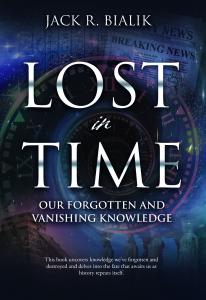Ten Years of Research Leads to an Exploration of More Than 300 Compelling Examples of Missing Historical Information
PHOENIX, AZ, UNITED STATES, October 28, 2025 /EINPresswire.com/ — A new nonfiction release from author and technologist Jack R. Bialik invites readers to rethink what humanity truly knows — and how much has already been lost.
In Lost in Time: Our Forgotten and Vanishing Knowledge (Mill City Press), Bialik explores more than 300 examples of discoveries, inventions, and ideas that have disappeared through time — from ancient medical procedures and early batteries to long-lost sanitation systems and philosophical traditions. The book argues that revisiting this “missing” history may hold the key to addressing modern challenges including sustainable knowledge, innovation, and cultural resilience.
Exploring the 98 Percent of History We Don’t Know
According to Bialik, just 1.6 percent of human history is preserved in any recorded form. The remaining 98.4 percent — including entire civilizations’ knowledge — has vanished.
The author weaves together vignettes from across centuries:
• Cataract surgery in India performed more than 2,000 years ago.
• A working fountain pen designed long before Europe’s first prototypes.
• Ancient waste systems as sophisticated as some modern counterparts.
• A Mesopotamian clay jar, known as the Baghdad Battery, that produced electricity centuries before Volta’s experiments.
• The Crypt of Civilization, sealed in 1940 with artifacts of 20th-century life and scheduled to reopen in the year 8113 AD.
A Cautionary Tale About Knowledge Loss
Through examples like the burning of the Library of Alexandria and the erasure of Mayan written records, Bialik illustrates how war, disaster, and cultural neglect repeatedly erase accumulated wisdom.
“Knowledge alone is fleeting and transient,” Bialik notes. “Wisdom — knowledge applied with ethics and purpose — is what endures from generation to generation.”
Relevance for a Digital Age
While rooted in ancient history, Lost in Time speaks directly to modern readers grappling with data fragility and digital impermanence. Bialik suggests that preserving human understanding requires more than archiving information — it requires ensuring that wisdom remains accessible and meaningful over time.
About the Author
Jack R. Bialik’s life and career have spanned the globe and the technological spectrum. His worldview was shaped by living in many states at an early age and traveling the world, giving him a unique lens on how different cultures operate. With a background in electrical engineering, his professional journey took him from working for the U.S. Air Force to a long, impactful career at Motorola, and eventually to contributions in White House technology initiatives and humanitarian efforts in Haiti. Bialik is global innovator and thought leader, who now dedicates his time to exploring the cyclical nature of human knowledge — and how we can do better at preserving it for future generations. This shift is at the core of his new book, Lost In Time: Our Forgotten and Vanishing Knowledge.
Book Information
Lost in Time: Our Forgotten and Vanishing Knowledge
By Jack R. Bialik
Publisher: Mill City Press | 266 pages
ISBN-13: 979-8868502293
Dea Shandera-Hunter
Self
+ +1 310-699-7880
email us here
Visit us on social media:
LinkedIn
Bluesky
Instagram
Facebook
YouTube
TikTok
X
Other
Legal Disclaimer:
EIN Presswire provides this news content “as is” without warranty of any kind. We do not accept any responsibility or liability
for the accuracy, content, images, videos, licenses, completeness, legality, or reliability of the information contained in this
article. If you have any complaints or copyright issues related to this article, kindly contact the author above.
![]()





